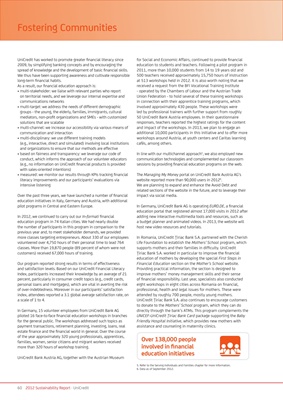
Fostering Communities
UniCredit has worked to promote greater financial literacy since for Social and Economic Affairs, continued to provide financial
2009, by simplifying banking concepts and by encouraging the education to students and teachers. Following a pilot program in
spread of knowledge and the development of basic financial skills. 2011, more than 10,000 students from 14 to 19 years old and
We thus have been supporting awareness and cultivate responsible 500 teachers received approximately 15,750 hours of instruction
long-term financial habits. at 513 workshops held in 2012. It is also worth noting that we
As a result, our financial education approach is: received a request from the BFI Vocational Training Institute
• multi-stakeholder: we liaise with relevant parties who report - operated by the Chambers of Labour and the Austrian Trade
on territorial needs, and we leverage our internal expertise and Union Federation - to hold several of these training workshops
communications networks in connection with their apprentice training programs, which
• multi-target: we address the needs of different demographic involved approximately 430 people. These workshops were
groups - the young, the elderly, families, immigrants, cultural led by professional trainers with further support from roughly
mediators, non-profit organizations and SMEs - with customized 50 UniCredit Bank Austria employees. In their questionnaire
solutions that are scalable responses, teachers reported the highest ratings for the content
• multi-channel: we increase our accessibility via various means of and impact of the workshops. In 2013, we plan to engage an
communication and interaction additional 10,000 participants in this initiative and to offer more
• multi-disciplinary: we use different training models workshops around Austria, at youth centers and Caritas learning
(e.g., interactive, direct and simulated) involving local institutions cafés, among others.
and organizations to ensure that our methods are effective
• based on fairness and transparency: we leverage our code of In line with our multichannel approach5, we also employed new
conduct, which informs the approach of our volunteer educators communication technologies and complemented our classroom
(e.g., no information on UniCredit financial products is provided sessions by providing financial education programs on the web.
with sales-oriented intentions)
• measured: we monitor our results through KPIs tracking financial The Managing My Money portal on UniCredit Bank Austria AG’s
literacy improvements and our participants‘ evaluations via website reported more than 90,000 users in 20126.
intensive listening We are planning to expand and enhance the Avoid Debt and
related sections of the website in the future, and to leverage their
Over the past three years, we have launched a number of financial impact via social media.
education initiatives in Italy, Germany and Austria, with additional
pilot programs in Central and Eastern Europe. In Germany, UniCredit Bank AG is operating EURO.DE, a financial
education portal that registered almost 17,000 visits in 2012 after
In 2012, we continued to carry out our In-formati financial adding new interactive multimedia tools and resources, such as
education program in 74 Italian cities. We had nearly double a budget planner and animated videos. In 2013, the website will
the number of participants in this program in comparison to the host new video resources and tutorials.
previous year and, to meet stakeholder demands, we provided
more classes targeting entrepreneurs. About 330 of our employees In Romania, UniCredit Ţiriac Bank S.A. partnered with the Cherish
volunteered over 4,750 hours of their personal time to lead 764 Life Foundation to establish the Mothers’ School program, which
classes. More than 19,870 people (89 percent of whom were not supports mothers and their families in difficulty. UniCredit
customers) received 67,000 hours of training. Ţiriac Bank S.A. worked in particular to improve the financial
education of mothers by developing the special First Steps in
Our program reported strong results in terms of effectiveness Financial Education section on the Mother’s School website.
and satisfaction levels. Based on our UniCredit Financial Literacy Providing practical information, the section is designed to
Index, participants increased their knowledge by an average of 21 improve mothers’ money management skills and their sense
percent, particularly in consumer credit topics (e.g., credit cards, of financial responsibility. Last year, specialists also conducted
personal loans and mortgages), which are vital in averting the risk eight workshops in eight cities across Romania on financial,
of over-indebtedness. Moreover in our participants’ satisfaction professional, health and legal issues for mothers. These were
index, attendees reported a 3.1 global average satisfaction rate, on attended by roughly 700 people, mostly young mothers.
a scale of 1 to 4. UniCredit Ţiriac Bank S.A. also continues to encourage customers
to donate to the Mothers’ School program, which they can do
In Germany, 15 volunteer employees from UniCredit Bank AG directly through the bank’s ATMs. This program complements the
piloted 16 face-to-face financial education workshops in branches UNICEF-UniCredit Ţiriac Bank Card package supporting the Baby
for the general public. The workshops addressed such topics as Friendly Hospital Initiative, which provides new mothers with
payment transactions, retirement planning, investing, loans, real assistance and counseling in maternity clinics.
estate finance and the financial world in general. Over the course
of the year approximately 320 young professionals, apprentices,
families, women, senior citizens and migrant workers received Over 138,000 people
more than 320 hours of workshop training. involved in financial
UniCredit Bank Austria AG, together with the Austrian Museum
education initiatives
5. Refer to the Serving Individuals and Families chapter for more information.
6. Data as of September 2012.
60 2012 Sustainability Report · UniCredit